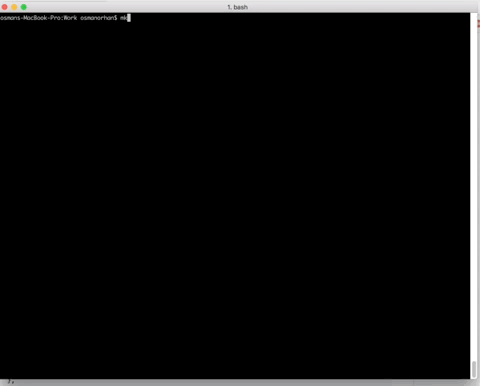brewinteractive / fakend
Installs: 34
Dependents: 0
Suggesters: 0
Security: 0
Stars: 9
Watchers: 2
Forks: 0
Open Issues: 0
pkg:composer/brewinteractive/fakend
Requires
- php: ^5.3.3|^7.0
- danielstjules/stringy: ~3.1.0
- fzaninotto/faker: *
- league/fractal: ~0.17.0
- memio/memio: ~2.0
- silex/silex: ~2.0
- symfony/console: *
This package is not auto-updated.
Last update: 2025-01-19 06:55:32 UTC
README
Fakend provides mock api from json schemas. It has been written in PHP and sits on a couple of great php libs such as thephpleague's fractal[1], fzaninotto's faker[2] and memio's generator lib[3].
- https://github.com/thephpleague/fractal
- https://github.com/fzaninotto/Faker
- https://github.com/memio/memio
It had been designed to provide mock API specifically for ember-data but this update changes model notation from ember-data model to global JSON notation to provide more flexible mock API backend for all frontend apps.
How to get
# Install Fakend curl -s https://osmanorhan.github.io/fakend/install.php | php
Quick Look:
How to define models for Fakend
You need to generate model files first. You have to place model files to /api/Models/ directory then you need to add class properties as shown:
post.js
{ "attrs": [ { "fieldName": "title", "attributeType": "title", "parameters": {"length":4} }, { "fieldName": "body", "attributeType": "description", "parameters": {"length":200,"html":true} }, { "fieldName": "tag", "attributeType": "random", "parameters": {"values": ["human","robot","android"]} }, { "fieldName": "date", "attributeType": "date", "parameters": {"from":"-4 year","to":"+1 year"} }, { "fieldName": "count", "attributeType": "numberBetween", "parameters": {"min":10,"max":1000} }, { "fieldName": "url", "attributeType": "url", "parameters": "{}" } ], "belongsTo": [ { "fieldName": "author", "attributeType": "author", "parameters": {"required":true} } ], "hasMany": [ { "fieldName": "comments", "attributeType": "comment", "parameters": {"required":false} } ] }
To resolve belongsTo:
author.js
{ "attrs": [ { "fieldName": "firstName", "attributeType": "firstName", "parameters": {} }, { "fieldName": "lastName", "attributeType": "lastName", "parameters": {} }, { "fieldName": "avatar", "attributeType": "imageURL", "parameters": {"type":"avatar","required":false} } } }
To resolve hasMany:
comment.js
{ "attrs": [ { "fieldName": "comment", "attributeType": "description", "parameters": {"length":50} } }, "belongsTo": [ { "fieldName": "post", "attributeType": "post", "parameters": {"required":true} } ] }
Parameters
How to generate model class
First, you "parser" executable symbolic link has been generated during install progress in first step. When you navigate to root directory folder then you can execute following command to generate schema files.
php parser generate [modelName]
If you do not provide modelName, fakend will generate php schema classes for all models. modelName is single model name to generate/update single model file.
#Example command
php parser post.js
This will generate /api/Schema/Post.php and will consist of model's attributes.
How to use
Fakend ships with basic silex app at api/ directory and each Fakend provides CRUD metods(GET/POST/PUT/DELETE) endpoint will be generated and placed at this file. New endpoints will be append end of this file.
If you want to optimize or change methods you can use followings. In index.php:
use Fakend\FakendFactory;
This adds fakend base class.
Fakend uses League's Fractal library for serializations. You can use following default fractal serializers or you can use your own custom serializer class to format your response data.
use League\Fractal\Serializer\JsonApiSerializer; use League\Fractal\Serializer\DataArraySerializer; use League\Fractal\Serializer\ArraySerializer;
A basic custom .NET web api serializer has been added to project as an example.
use Fakend\Presentation\Serializers\WebApiSerializer;
Then you need to initialize related model class and need to pass serializer.
$post = FakendFactory::create('post'); $post->setSerializer(new JsonApiSerializer()); $return = $post->setMeta(array('totalCount' => 11))->getMany(5);
From $post variable, you can call:
Docker
We provide a docker container(PHP & NGINX) at root directory. You just need to build & up.
Silex example
$app->match('/posts', function(Request $request) use ($app) { if($request->getMethod() == 'OPTIONS') { return new Response('', 200); } $post = FakendFactory::create('post'); $post->setSerializer(new JsonApiSerializer()); $return = $post->setMeta(array('totalCount' => 11))->getMany(5); return new Response($return, 200, array( 'Content-Type' => 'application/json', )); })->method('GET|OPTIONS'); $app->match('/posts/{id}', function($id, Request $request) use ($app) { if($request->getMethod() == 'OPTIONS') { return new Response('', 200); } $post = FakendFactory::create('post'); $post->setSerializer(new JsonApiSerializer()); $return = $post->get($id); return new Response($return, 200, array( 'Content-Type' => 'application/json', )); })->method('GET|OPTIONS'); $app->match('/posts/{id}', function($id, Request $request) use ($app) { if($request->getMethod() == 'OPTIONS') { return new Response('', 200); } $return = json_encode(array()); return new Response($return, 200, array( 'Content-Type' => 'application/json', )); })->method('DELETE|OPTIONS');
You can find sample outputs for this example in samples/ folder.

